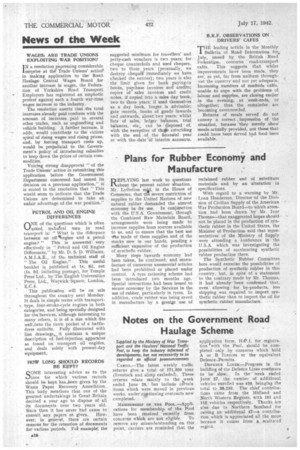Plans for Rubber Economy and Manufacture
Page 20

If you've noticed an error in this article please click here to report it so we can fix it.
REPLYING last week to questions about the present rubber situation, Mr. Lyitelton sail, in the House of Commons, that the severe restriction of supplies to the United Nations of new natural rubber demanded the utmost economy in its use. In conjtinction with the U.S.A. Goveinment, through the Combined Raw Materials Board, arrangements were being made to increase supplies from sources available to us, and to ensure that the best use sets made of these supplies and of the stocks now in our hands, pending a sufficient expansionof the production of synthetic rubber.
Many steps towards ,economy had been taken, he continued, and manufacture of numerous unessential articles had been prohibited or placed under control. A tyre rationing scheme had been introduced two months ago. Special instructions had been issued to secure economy by the Services in the use of rubber, particularly in tyres. In addition, crude rubber was being saved in manufacture by a greatgr use of
reclaimed rubber and of substitute materialsand by an alteration in specifications.
With regard to a warning by Mr. Loan Henderson, Director 'of the Division of Civilian Supply of the American War Production Board—to which attention had been drawn 'by' Mr. Ivor Thomas—that exaggerated hopes should not be placed in the production of synthetic rubber in the United States, the Minister of Production said that representatives of the Ministry of Supply were attending a conference in the U.S.A. which was investigating the possibilities of accelerating synthetic rubber production there.
The Synthetic Rubber Committee here would examine the possibilities of production of synthetic rubber in this country, but, in spite of a statement to the contrary made by Mr. Thomas, it had already been confirmed that, even allowing for by-products, less shipping was required to import synthetic rubber than to import the oil for synthetic rubber manufacture.




















































